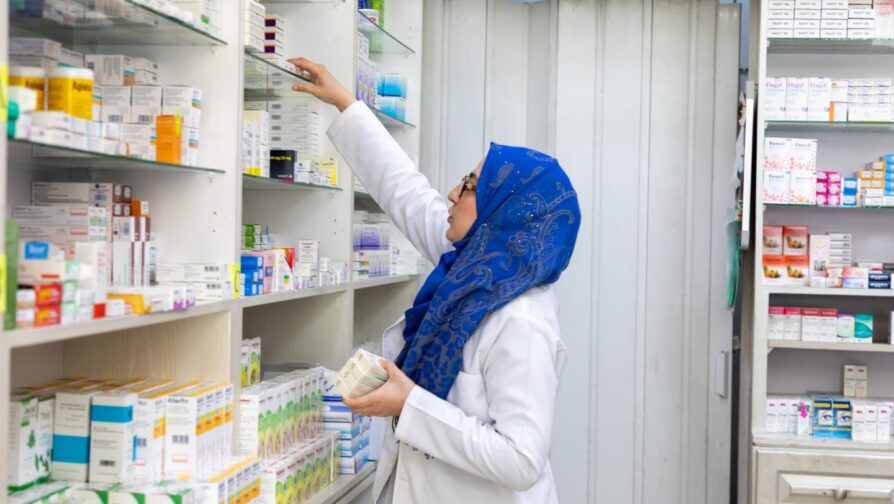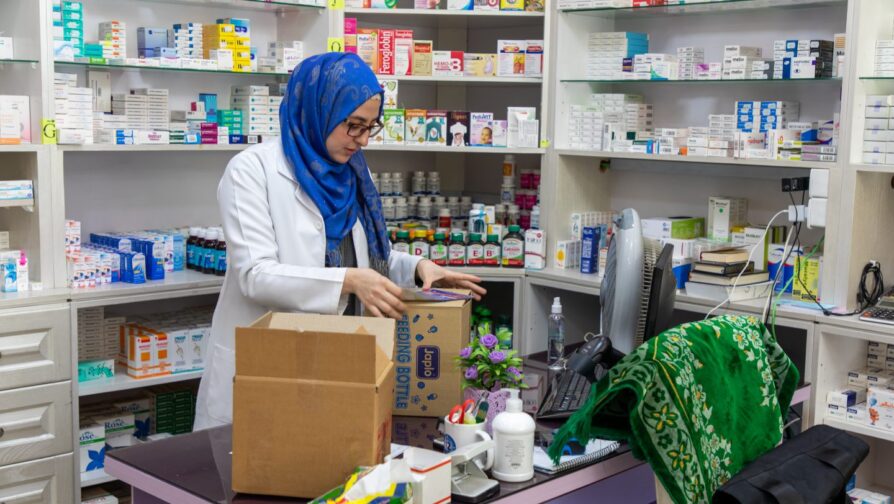With help from the UN Refugee Agency and the COVID-19 Solidarity Response Fund, she has become a trusted source of accurate health information about COVID-19 for many fellow refugees.

Salam AlHariri, 26, is a Syrian refugee and pharmacist in Jordan. © UNHCR/Lilly Carlisle
Salam al-Hariri is a Syrian refugee, a trainee pharmacist in Jordan, and a social media whiz. With help from the UN Refugee Agency and the COVID-19 Solidarity Response Fund, she has become a trusted source of accurate health information about COVID-19 for many fellow refugees.
Most mornings, Salam al-Hariri wakes early to the sound of her 4-month-old daughter crying for attention. After feeding her and having a coffee with her husband, she walks the 10 minutes down the road to the local community pharmacy in Amman where she is a trainee.
Doors open at 8 a.m. sharp, so she makes sure all the stock is in place. A constant stream of customers pour in to collect their prescriptions, stock up on cosmetics, or simply stop by for a chat.

Salam AlHariri, 26, is a Syrian refugee and pharmacist in Jordan.
“I’ve been here for around two years now,” Salam said. “I know everyone, and they know me. They trust me.”
This trust has been particularly crucial over the past couple of months. After the first cases of coronavirus were identified in Jordan at the beginning of March, strict curfews soon followed, with residents allowed out of their homes only between certain hours and often allowed to move around only by foot. The importance of community pharmacies quickly became clear.
“People were afraid,” al-Hariri said. “At the beginning they didn’t know many details about this virus. They were stuck at home watching TV, and the numbers of cases around the world kept going up and no one was really sure what was happening in Jordan.”
Determined to learn everything there was to know about coronavirus, al-Hariri became an instant source of reassurance, answering any questions that came her way on topics ranging from the best type of mask to wear to responding to any false rumors spreading in the community. Now she’s taking that trust and using her training to reach a wider audience on social media with accurate health advice. A refugee herself, she answers questions related to COVID-19 from other refugees by posting videos on her Instagram.

Salam AlHariri, 26, is a Syrian refugee and pharmacist in Jordan.
She’s even receiving inquiries from friends and family back home in Syria about the right procedures to adopt when it comes to preventing the spread of the pandemic. Recently, she joined Dominik Bartsch, the UN Refugee Agency (UNHCR) representative to Jordan, for a live question and answer session on Twitter for World Refugee Day.
“We all have a role to play,” al-Hariri said. “Refugees are an important part of the response, and I’m able to provide a different perspective thanks to my pharmacy training.”
She fled her home in Daraa, Syria, with her mother and two younger siblings in 2012. She had just started studying chemistry at the University of Damascus when the conflict escalated. She had to abandon her studies after just two weeks as the hour-long bus ride to attend lectures was no longer safe.
Moving around from village to village to escape fighting, the family eventually had no choice but to flee Syria.
“I remember I just slept for the first three days. I was so exhausted. It had been four months of fear before we left,” al-Hariri said.
Being in Jordan sparked her motivation to be successful, so for the first year, she applied for every available scholarship for an opportunity to continue her studies.

Eventually she was accepted into the UNHCR DAFI (Albert Einstein German Academic Refugee Initiative) scholarship program to study pharmacy at the University of Jordan. For four years, she dedicated herself to becoming an expert in her field, graduating with some of the top grades in her class. Now, almost nine years after arriving in Jordan, al-Hariri is determined to give back to the community that has given her so much and to help fellow refugees.
“I realize I am lucky,” she said. “I have a voice, and because of my education I can help.”
Through funding from the COVID-19 Solidarity Response Fund — the foremost way for individuals, companies, and philanthropies to directly support the global response to the pandemic by the World Health Organization and its partners — UNHCR Jordan aims to support refugees like Salam al-Hariri.
“Together with UNHCR, through this solidarity contribution, we can ensure that the refugee community is protected from COVID-19,” says Dr. Maria Cristina Profili, WHO representative to Jordan.
This piece was provided by UNHCR and has been edited and published with permission.
More than half a million registered Syrian refugees have relocated to Jordan since the start of the civil war in their country, now in its 10th year. In addition to the challenges this community faces as a result of years of conflict and displacement, COVID-19 has brought health and economic strains.
In June, at the direction of WHO, UNHCR received $10 million from the COVID-19 Solidarity Response Fund — created by the United Nations Foundation, in partnership with the Swiss Philanthropy Foundation — to support its lifesaving work to combat the pandemic in some of the world’s most vulnerable places.
